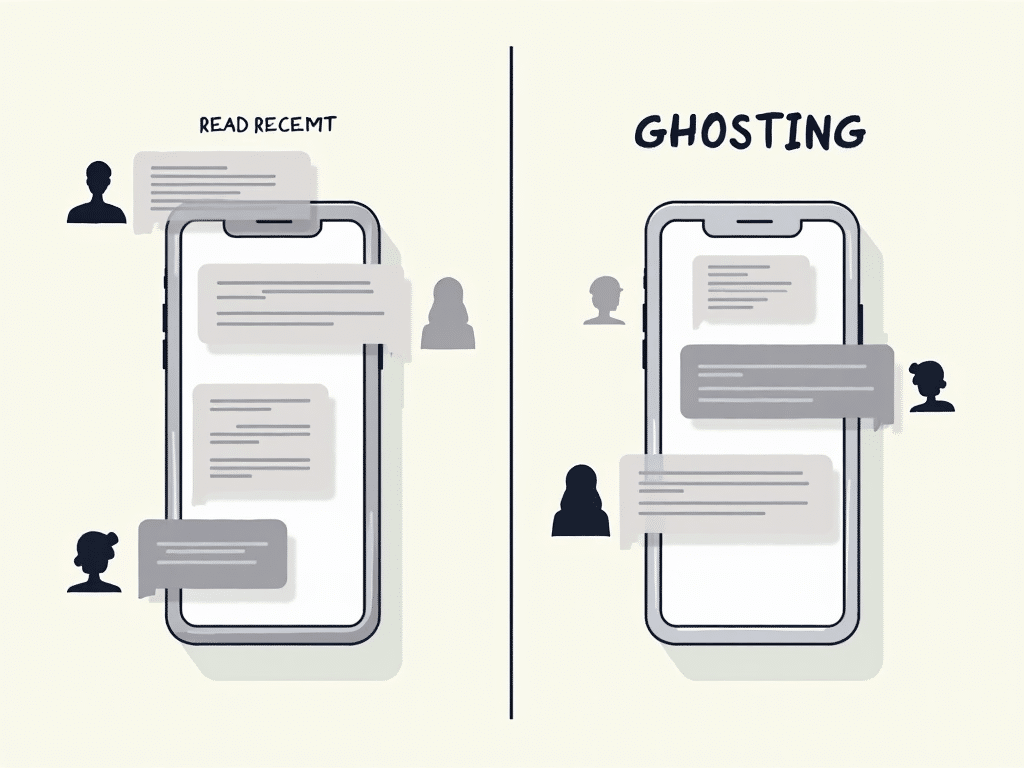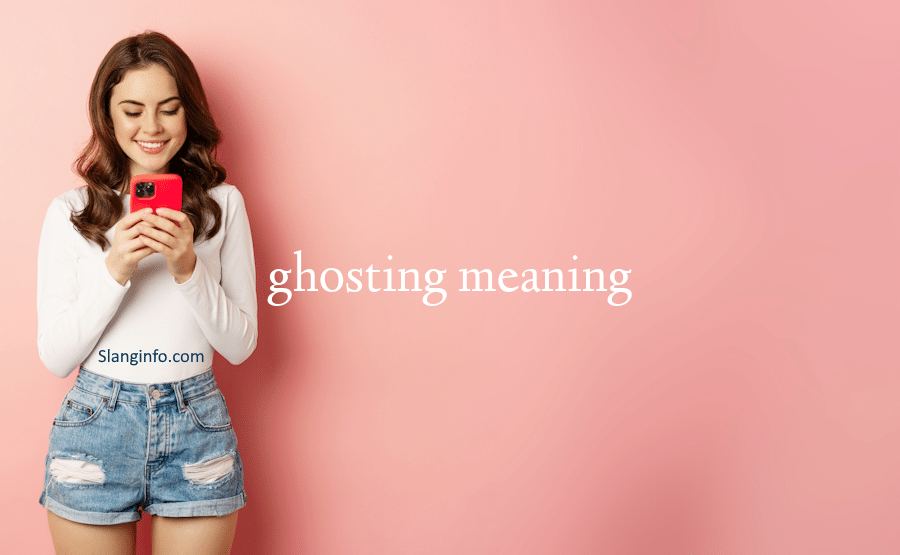Picture this: you’ve been chatting with someone for a while, things seem to be going great, and then suddenly… radio silence. No more texts, no more DMs, no more anything. Congrats, my friend, you’ve just been ghosted! 😱 But what exactly does ghosting mean, and why has it become such a common occurrence in today’s dating world? Let’s dive in and find out!
| Key Takeaways | Description |
|---|---|
| Definition | Ghosting is the act of abruptly ending communication without explanation |
| Common Scenarios | Dating, friendships, professional relationships |
| Key Characteristics | Sudden, unexplained, unilateral |
| Emotional Impact | Confusion, self-doubt, abandonment issues |

What is Ghosting?
At its core, ghosting is the act of suddenly and unexpectedly ending all communication with someone, without providing any explanation or closure. It’s like the person just vanished into thin air, leaving you wondering what the heck happened. 🤔
Ghosting can happen in all sorts of relationships, but it’s most commonly associated with dating. You know, when you’ve been texting your crush non-stop, and then they just disappear off the face of the earth? Yeah, that’s ghosting. 📱👻
But ghosting isn’t just limited to romantic relationships. It can happen in friendships, professional relationships, and even family dynamics. Basically, if someone cuts off contact without a word, they’re pulling a Casper on you. 👻
Origins of the Term “Ghosting”
So, where did this spooky term come from? 🎃 Well, the concept of abruptly ending communication isn’t new, but the term “ghosting” is relatively recent.
It’s believed that the term first popped up in the early 2000s, but it didn’t really gain mainstream traction until the mid-2010s. With the rise of dating apps and social media, ghosting became a more prevalent issue, and the term started to be used more frequently in popular culture. 📈
Nowadays, ghosting has become a common part of the modern dating lexicon, along with other Gen Z slang terms like “situationship” and “catching feelings.” It’s even been the subject of countless memes, tweets, and Instagram posts. Because if you haven’t been ghosted, are you even living in the 21st century? 🤷♀️
Why Do People Ghost?

Now, you might be wondering: why would someone choose to ghost instead of just being upfront and honest? Well, there are a few possible reasons:
- Avoidance: Some people hate confrontation and would rather just disappear than have a difficult conversation. 😬
- Fear: They might be afraid of hurting the other person’s feelings or dealing with their reaction. 😨
- Immaturity: Let’s face it, some people just lack the emotional maturity to communicate effectively. 🙄
- Convenience: In the age of digital communication, it’s easier than ever to cut ties with someone without any real consequences. 📵
Of course, none of these reasons make ghosting okay. It’s still a pretty crappy thing to do, and it can leave the person on the receiving end feeling confused, hurt, and rejected. 💔
The Psychology of Ghosting
Speaking of feelings, let’s talk about the emotional impact of ghosting. When someone ghosts you, it can really mess with your head. 🤯
For starters, it can leave you feeling confused and unsure of what went wrong. You might start questioning yourself and wondering if you did something to push the person away. 🤔
It can also trigger feelings of abandonment and rejection, especially if you had started to develop feelings for the person. Being ghosted can make you feel like you’re not good enough or like you’re unworthy of love and respect. 😞
In some cases, ghosting can even lead to more serious mental health issues like anxiety, depression, and trust issues. It’s no joke! 🚨
So, if you’ve been ghosted, it’s important to remember that it’s not your fault. The other person’s behavior says way more about them than it does about you. And if you’re the one doing the ghosting? Maybe take a moment to consider the impact your actions could have on the other person. A little empathy goes a long way! 💕
How to Respond to Being Ghosted

Alright, so you’ve been ghosted. It sucks, but don’t worry – you’re not alone, and there are ways to deal with it. Here’s what you can do:
- Acknowledge your feelings: It’s okay to feel hurt, angry, or confused. Don’t try to bottle up your emotions. 😤
- Don’t blame yourself: Remember, ghosting says more about the ghoster than it does about you. You’re not responsible for someone else’s poor communication skills. 🙅♂️
- Resist the urge to reach out: It might be tempting to send that “u up?” text at 2 AM, but trust me, it’s not worth it. Respect yourself and maintain your dignity. 💪
- Focus on self-care: Treat yourself to something nice, hang out with friends, or dive into a new hobby. Anything that makes you feel good! 🧘♀️
- Learn and grow: Use this experience as an opportunity for personal growth. What can you learn from it? How can you communicate better in future relationships? 🌱
Remember, being ghosted doesn’t define your worth. You’re awesome, with or without that person’s validation! 🌟
Prevention and Communication Strategies
While you can’t control other people’s actions, there are some things you can do to reduce the chances of being ghosted (or accidentally ghosting someone else):
- Be clear about your expectations: If you’re looking for a serious relationship, say so. Don’t play games or try to be someone you’re not. 🗣️
- Pay attention to red flags: If someone is consistently flaky or gives mixed signals, they might be more likely to ghost. Trust your gut! 🚩
- Communicate openly: If something’s bothering you, speak up. Encourage open and honest communication in your relationships. 💬
- Be respectful: If you’re not interested in someone, be honest and kind about it. A simple “I don’t think we’re a good match” is better than ghosting. 🤝
The Impact of Technology on Ghosting
Let’s face it: technology has made ghosting way too easy. With just a few taps, you can block someone, delete their number, and poof! They’re gone from your life. 📱✨
Social media and dating apps have also created a culture of disposability in relationships. With so many options at our fingertips, it’s easy to move on to the next person without giving much thought to the feelings of others. 😕
But here’s the thing: just because technology makes it easy to ghost doesn’t mean it’s okay. We need to remember that there are real people with real feelings behind those profile pictures and text messages. 💖
Ghosting in Different Contexts
While we often think of ghosting in terms of romantic relationships, it can happen in other areas of life too:
- Friendships: Ever had a friend who just stopped responding to your texts out of the blue? Yep, that’s friendship ghosting. 👯♀️
- Professional relationships: Ghosting happens in the work world too. Think of that recruiter who never called you back after a promising interview. 👔
- Family: Even family members can ghost each other, especially in cases of estrangement or conflict. 👨👩👧👦
The impact of ghosting can be just as hurtful in these contexts as it is in romantic relationships. It’s always important to treat others with respect and kindness, no matter what kind of relationship you have with them. 🤗
Conclusion
Ghosting is a complex and often painful phenomenon that’s become all too common in our digital age. While it might seem like an easy way out of an uncomfortable situation, it can have serious emotional consequences for the person being ghosted.
Remember:
- If you’ve been ghosted, it’s not your fault. 🚫
- If you’re tempted to ghost someone, consider the impact of your actions. 🤔
- Open, honest communication is always the best policy, even if it’s uncomfortable. 💬
At the end of the day, we’re all human beings deserving of respect and kindness. So let’s try to treat each other a little better, shall we? No more disappearing acts – unless you’re an actual ghost, in which case, carry on! 👻
P.S. If you’re still feeling down about being ghosted, remember: YOLO! There are plenty of fish in the sea, and the right person won’t leave you hanging. Keep your chin up and keep swiping! 😉🎣
Want to learn more about modern dating and relationships? Check out our articles on situationships, catching feelings, and other Gen Z slang terms. And don’t forget to share this post with your friends – because knowledge is power, and we’re all in this crazy dating world together! 💪💕







